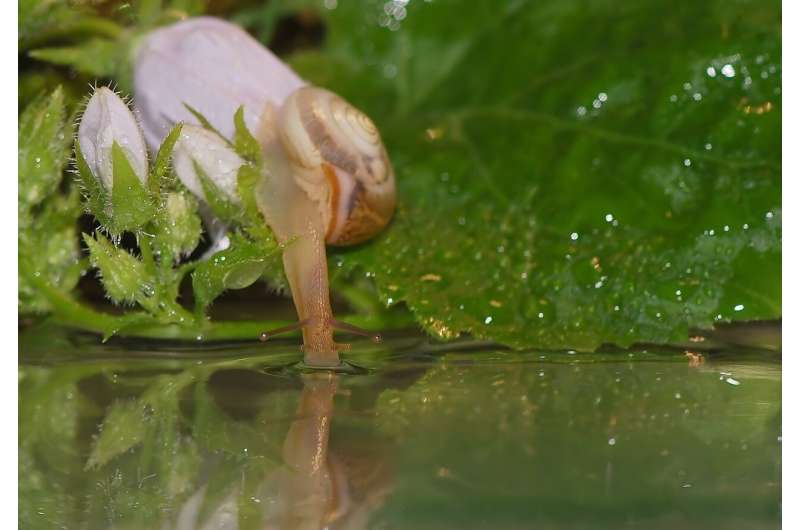
Antibiotics prevent snails from forming new memories by disrupting their gut microbiome—the community of beneficial bacteria found in their guts.
The new research, led by the University of East Anglia (UEA) in collaboration with Aberystwyth University, highlights the damaging effects that human pollution could be having on aquatic wildlife.
In the study published in The ISME Journal, pond snails were given a favorite food—carrot juice—but had to quickly learn and remember that it was no longer safe to eat.
Snails in clean water did well, avoiding feeding on the carrot juice when it had been paired with a chemical they dislike. However, snails that had been exposed to high concentrations of antibiotics in the water failed to learn and form a memory, and continued to show normal feeding behavior even after training.
Lead author Dr. Gabrielle Davidson, of UEA’s School of Biological Sciences, said, “It’s well known that a healthy gut microbiome is important to human health, and our study is the first to show this is also the case in snails.”
The researchers found the antibiotics altered the gut microbiome substantially and changed the abundance of bacteria that have been found to relate to healthy memory formation in other animals, including humans. This relationship between the bacteria found in the gut and brain function is called the microbiome-gut-brain axis. Chemicals produced by good gut bacteria when breaking down food can improve brain health and cognitive function.
Reducing the abundance of these healthy bacteria in the gut blocks the gut microbiome’s otherwise beneficial effects on the brain.
Previous studies on the link between the gut microbiome and brain function have focused on terrestrial species. However, aquatic wildlife is more likely to be directly affected by antibiotic exposure in the environment.
Antibiotics are not removed effectively by waste treatment, and so they enter the freshwater environment. The antibiotic concentrations snails were exposed to in this new experiment were detected at similar levels in freshwater in the UK, Europe and globally.
If freshwater pollution prevents snails from having a healthy microbiome, they won’t be able to use their brains to adjust their behavior when they encounter new information.
Co-author Dr. Sarah Dalesman, of Aberystwyth University, said, “Previous research has found pond snails have to learn about predators, what is good or bad to eat, and even remember who they have mated with. Anything that interferes with their memory will reduce their survival.”
The researchers say this is especially worrying in the face of the many new environmental challenges animals experience from human activities.
Dr. Davidson added, “If we find this effect in snails, it is highly likely that antibiotics are having similar effects on other aquatic animals. We hope this study prompts greater emphasis on the importance of healthy gut microbiomes for wildlife and increases efforts to reduce the chemicals entering our environment.”
More information:
Gabrielle Davidson et al, Antibiotic-altered gut microbiota explain host memory plasticity and disrupt pace-of-life trait covariation for an aquatic snail, The ISME Journal (2024). DOI: 10.1093/ismejo/wrae078
Citation:
Antibiotic pollution disrupts the gut microbiome and blocks memory in aquatic snails, study finds (2024, May 29)
retrieved 29 May 2024
from https://phys.org/news/2024-05-antibiotic-pollution-disrupts-gut-microbiome.html
This document is subject to copyright. Apart from any fair dealing for the purpose of private study or research, no
part may be reproduced without the written permission. The content is provided for information purposes only.







